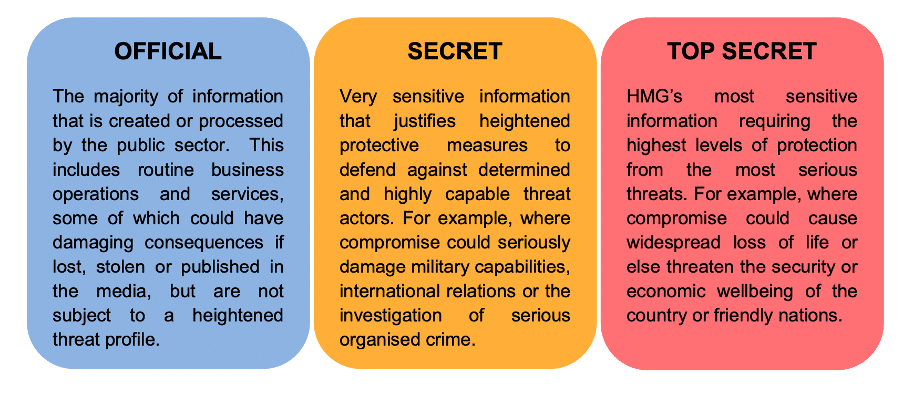Safeguarding Government Information in the Digital Age
In today’s rapidly evolving digital landscape, the protection of sensitive government information has become imperative for not only the UK, but every country that looks to protect its own digital assets. As technology advances and cyber threats grow more sophisticated, the concept of classification levels has emerged as a critical framework for safeguarding government data. In this blog, we will delve into the importance of classification levels and how they play a crucial role in ensuring the security and integrity of government information in the digital age.
What Are Classification Levels?
Classification levels are a categorisation system used by the UK government to determine the sensitivity of information and the level of protection it requires. HMG information assets may be classified into three classification levels: OFFICIAL, SECRET, and TOP SECRET. Each level represents a varying degree of sensitivity of information and the corresponding protective measures that must be implemented.
As a minimum, all HMG information must be handled with care to comply with legal and regulatory obligations and reduce the risk of loss or inappropriate access.
“Everyone who works with government has a duty to respect the confidentiality and integrity of any HMG information and data that they access, and is personally accountable for safeguarding assets in line with this policy.” – Cabinet Office
OFFICIAL: The Foundation of Information Security
The OFFICIAL classification encompasses the majority of information created or processed by the public sector. It includes routine business operations and services that, if lost, stolen, or disclosed, could have severe & detrimental consequences.
ALL routine public sector business, operations and services should be treated as OFFICIAL – many departments and agencies will operate exclusively at this level. This includes a wide range of information, of differing value and sensitivity, which needs to be defended against the threat profile and to comply with legal, regulatory and international obligations.
The OFFICIAL tier provides for the generality of government business, public service delivery and commercial activity.
OFFICIAL-SENSITIVE: Heightened Sensitivity and Enhanced Controls
OFFICIAL-SENSTIVE is a handling caveat which represents particularly sensitive information that falls within the OFFICIAL classification. While it may not meet the criteria for higher tiers, the loss or compromise of OFFICIAL-SENSITVE information can still have severe consequences.
Such information can be managed at the same classification level, but with a more prescriptive information handling model, potentially supported by extra procedural or technical controls to reinforce the need to know. Strict adherence to the “need to know” principle is crucial when handling this information, especially when sharing it outside of routine or well-understood business processes.
This more sensitive information is identified by adding ‘Sensitive’, and must therefore be marked ‘Official-Sensitive’. This marking alerts users to the enhanced level of risk and that additional controls are required.
Don’t look for assurance that a system is ‘good for OFFICIAL-SENSITIVE’. A system that can handle OFFICIAL data may be appropriate to handle sensitive information.
SECRET: Protection against Determined Threats
SECRET classification is reserved for highly sensitive information that requires heightened protective measures. Information at this level, if compromised, could seriously threaten an individuals life, damage military capabilities, intelligence operations, international relations, security and resilience of Critical National Infrastructure (CNI) assets or cause major impairment to the investigation of serious organised crime.
Information at this level, if compromised, could seriously threaten an individual’s life, damage military capabilities, intelligence operations, international relations, security and resilience of Critical National Infrastructure (CNI) assets or cause major impairment to the investigation of serious organised crime.
TOP SECRET: Highest Level of Protection for Critical Information
Top Secret is the most sensitive classification level, demanding the utmost protection against the most serious threats. Information classified as TOP SECRET, if compromised, could lead to widespread life at risk or it could threaten the security and economic well-being of the UK or friendly nations.
This level remains reserved for exceptionally sensitive HMG (or partners) information relating to national security of the UK or allies and requires extremely high assurance of protection from all threats.
The Significance of Classification Levels in the Digital Age
In an era of increasing cyber threats and data breaches, classification levels play a pivotal role in protecting government information. They ensure that sensitive data is handled with the appropriate level of care, enabling the UK government to mitigate risks and safeguard national security. From Critical National Infrastructure (CNI) and Defence operations to healthcare systems and law enforcement, classification levels provide a consistent framework for managing the security of government information across various sectors.
However, it is important to recognise that the implementation of classification levels is not without challenges. Digital assets and procedures may be subject to other sovereign laws and procedures, which could potentially compromise the UK’s ownership and control over its information. Furthermore, the global nature of digital technologies means that some digital assets are developed and hosted outside of the UK, making complete control over all digital technologies and data unfeasible.
Classification levels serve as a crucial framework for safeguarding government information in the digital age. By categorising information based on its sensitivity and implementing appropriate protective measures, the UK government can ensure the confidentiality, integrity, and availability of critical data. As technology advances and threats evolve, the ongoing refinement of classification systems and continuous dialogue surrounding their importance will remain essential to maintain the security of government information in an increasingly interconnected world.
Nine23 have consistently achieved the highest levels of accreditation (ISO 9001, 27001, ISO/IEC 20000-1, ISO 14001) from national bodies to provide confidence that the systems we develop can be used at highly classified levels of cyber security (OFFICIAL-Sensitive to Secret).
Contact us for more information.



